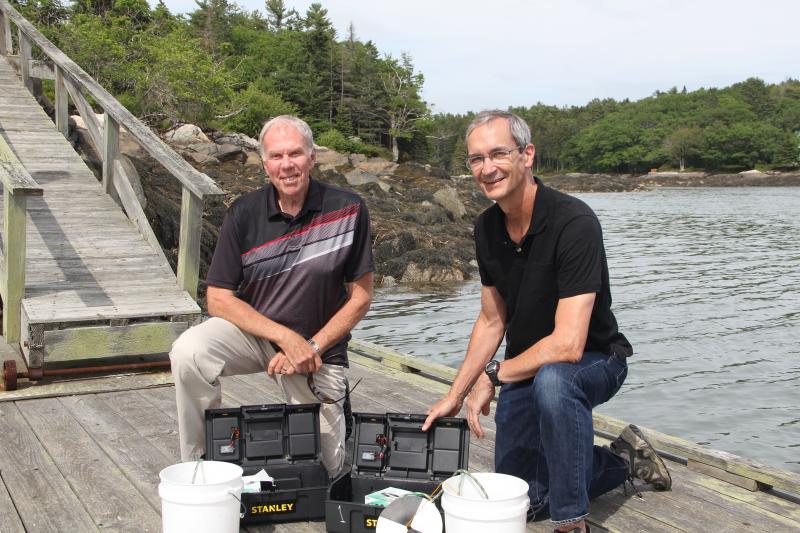Last week marked the first gathering of a new Science Advisory Board established to provide guidance to Boothbay Region Land Trust’s (BRLT) Coastal Water Monitoring Program. The board members brought together a range of scientific expertise, and included representatives from Bigelow Laboratory, the University of Maine Darling Marine Center, the Maine Coastal Observing Alliance (MCOA), and the Department of Environmental Protection. Additionally, the project coordinator from the Kennebec Estuary Land Trust water sampling program and a representative of the Maine Department of Marine Resources also attended. BRLT program coordinators, Ed Green and Robert Jordan, facilitated the meeting with the aims of discussing challenges, as well as developing strategic goals for our program moving forward.
BRLT’s Coastal Water Sampling Program began four years ago in an effort to provide regular water quality monitoring for the Boothbay region. Recognizing the connection between land and water, BRLT saw a direct relationship between our mission of land conservation and coastal water quality. The coastal waters are a significant natural resource for our community and its wildlife, and understanding the impacts and interconnections of land and water not only informs how we manage land, but also how the public views conservation issues in our region.
Ed Green, a volunteer with a background in science, was instrumental in helping to establish the program. Growing up on the Maine coast, Green is particularly attuned to the changes taking place in our region. He notes, “I remember digging clams for the evening chowder, picking mussels, and catching haddock not far off shore. I also remember people throwing their trash directly into the ocean. As a kid I can recall asking what happened to all of that trash, and the response was ‘The ocean cleanses itself.’ That was what they thought.” Green has worked tirelessly to ensure the quality of the sampling, as well as to connect BRLT with researchers who can utilize our data.
Last winter Green participated in a number of webinars on ocean acidification designed for citizen science groups, as well as a day-long workshop with marine scientists. His networking ultimately led to a request for BRLT water sampling data by researchers from the University of Maine. The data will be used as part of a NOAA-funded study to assess ocean acidification on Maine coastal estuaries.
Robert Jordan, another early volunteer to the program, has lent his expertise with computers and technology. He has ensured that the data collected over the past four years is accessible to researchers as well as the public on the BRLT website, and is currently working, with the assistance of the Darling Marine Center, to add the BRLT datasets to the ERDDAP database, a permanent, searchable location for scientific data to be accessed by researchers.
Last week’s gathering provided BRLT the opportunity to brainstorm methods for extending the reach of our water sampling program even further. Topics of discussion included considering how our data can better reach and meet the needs of researchers, how best to collaborate with similar programs along the coast, and possible methods for growing the current water sampling program. The board also provided valuable feedback on questions regarding data collection and instrumentation.
Board members were able to advance several promising new directions for BRLT’s program to grow, including the possibility of creating a shared sampling event that would coordinate a large-scale effort across multiple professional and citizen sampling programs in the Midcoast region. This would provide a larger unified picture of the state of the region’s bays and estuaries. Other potential areas of growth involved adding low-tide sampling (currently our program samples only at high-tide) and sampling for nitrogen concentrations. We were very pleased with the interest the board took in our sampling program and their desire to help us find ways to utilize the team of volunteers we have assembled. We look forward to continuing to meet with the board semi-annually, as a resource for advancing the work of this program.
BRLT is a non-profit land conservation organization. Our Coastal Water Sampling Program relies on financial contributions from members and volunteer support. If you are interest in volunteering as a water sampler for the upcoming season, please contact Tracey Hall at thall@bbrlt.org






























